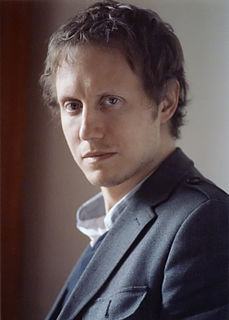A Quote by Robert Fogel
The rate of technological and human physiological change in the 20th century has been remarkable. Beyond that, a synergy between the improved technology and physiology is more than the simple addition of the two.
Related Quotes
The different American experience of the 20th Century is crucial because the lesson of the century for Europe, which essentially is that the human condition is tragic, led it to have a build a welfare system and a set of laws and social arrangements that are more prophylactic than idealistic. It's not about building perfect futures; it's about preventing terrible pasts. I think that is something that Europeans in the second half of the 20th century knew in their bones and Americans never did, and it's one of the big differences between the two Western cultures.
The planet has a kind of intelligence, it can actually open a channel of communication with an individual human being. The message that nature sends is, transform your language through a synergy between electronic culture and the psychedelic imagination, a synergy between dance and idea, a synergy between understanding and intuition, and dissolve the boundaries that your culture has sanctioned between you, to become part of this Gaian supermind
We have progressed in a technological sense, but I'm not so sure whether we have progressed in a civilizational matter - the quality of the civilization has not improved. It's a civilization that's in love with technology but forgetting about the human side of it and the destructive tendency in human civilization has not been faced.
We have to do away with a false and misleading dualism, one which abstracts man on the one hand and technology on the other, as if the two were quite separate kinds of realities.... Man is by nature a technological animal; to be human is to be technological.... When we speak of technology, this is another way of speaking about man himself in one of his manifestations.
In the 20th century, we had a century where at the beginning of the century, most of the world was agricultural and industry was very primitive. At the end of that century, we had men in orbit, we had been to the moon, we had people with cell phones and colour televisions and the Internet and amazing medical technology of all kinds.
Hell is out of fashion - institutional hells at any rate. The populated infernos of the 20th century are more private affairs, the gaps between the bars are the sutures of one's own skull. A valid hell is one from which there is a possibility of redemption, even if this is never achieved, the dungeons of an architecture of grace whose spires point to some kind of heaven. The institutional hells of the present century are reached with one-way tickets, marked Nagasaki and Buchenwald, worlds of terminal horror even more final than the grave.
I was really interested in 20th century communalism and alternative communities, the boom of communes in the 60s and 70s. That led me back to the 19th century. I was shocked to find what I would describe as far more utopian ideas in the 19th century than in the 20th century. Not only were the ideas so extreme, but surprising people were adopting them.
Anyone who has studied the history of technology knows that technological change is always a Faustian bargain: Technology giveth and technology taketh away, and not always in equal measure. A new technology sometimes creates more than it destroys. Sometimes, it destroys more than it creates. But it is never one-sided. The invention of the printing press is an excellent example. Printing fostered the modern idea of individuality but it destroyed the medieval sense of community and social integration.







































